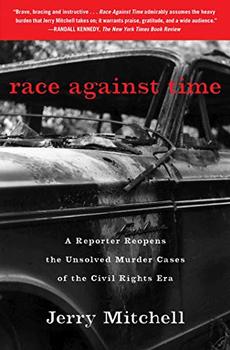Summary | Excerpt | Reviews | Beyond the Book | Readalikes | Genres & Themes | Author Bio

A Reporter Reopens the Unsolved Murder Cases of the Civil Rights Era
by Jerry Mitchell
Moore turned to speak to the two men behind us. They included Jim Ingram, a six-foot-four Oklahoma native who had been involved in the investigation and headed the FBI's civil rights desk in Mississippi, and veteran journalist Bill Minor, who had covered the killings and invited the pair here.
While the rest of the press left, I lingered and listened to these old men, wondering why my history teachers had failed to mention these events in class. I peppered the men with questions about the case. They told me that more than twenty Klansmen had taken these three young men out to a dark, remote road and executed them. They said locals knew these suspects, yet no one turned them in. The perpetrators kept working and walking the streets as if they had been caught speeding, rather than carrying out a triple murder.
"No one was ever prosecuted for murder?" I asked.
"Nobody," Moore replied.
I had heard of people getting away with murder before, but I had never heard of twenty people getting away with murder at the same time—no less, in a case that made headlines around the globe. They had shot to death these three young men, and the state of Mississippi had done nothing about it. How was that possible?
Even now, the former investigators seemed at a loss to explain it.
Mississippi Burning became one of the nation's most controversial films. Critic Roger Ebert called it "the best film of 1988," saying it makes "an important statement about a time and a condition that should not be forgotten." But veterans of the civil rights movement bashed the movie for turning agents from J. Edgar Hoover's FBI into heroes while portraying activists as cowards.
The bickering blazed hotter in Mississippi than anywhere else. Crowds flocked to the film, some to be entertained and some to be outraged. Mississippi governor Ray Mabus, who had Hollywood good looks to go with his Harvard University education, appeared on the Today show and spoke to the National Press Club. "The message I don't want people thinking is, 'That's Mississippi today.' The message I do want them coming out with is how far Mississippi has come. I know that there are things in our past that everybody would like to change—in all of our pasts—but we can't affect that. What we can affect is the future."
As I wrapped up my story on the film premiere, I sought a comment from Mabus's office, telephoning his press secretary, Kevin Vandenbroek. He echoed the party line about the film: "A mixed blessing. If there's a silver lining, it gives Mississippi a chance to say, 'That was then' and, 'This is what's going on now.'?"
But there was something else he wanted to say. He asked to go off the record, and I agreed. An award-winning radio and TV reporter before taking his current job, Vandenbroek couldn't resist sharing a little advice. "Have you ever thought about the case, the real murders being revisited?"
"No," I said.
"You know it's not too late. Bill Baxley, the attorney general over in Alabama, prosecuted some Klan cases back in the seventies. Went after those bastards that blew up those four girls in the Birmingham church."
"I didn't know that. How can you—?"
"I thought you were a court reporter."
"I am."
"Aren't you forgetting something?"
"What's that?"
"There is no statute of limitations for murder."
Excerpted from Race Against Time by Jerry Mitchell. Copyright © 2020 by Jerry Mitchell. Excerpted by permission of Simon & Schuster. All rights reserved. No part of this excerpt may be reproduced or reprinted without permission in writing from the publisher.
Your guide toexceptional books
BookBrowse seeks out and recommends the best in contemporary fiction and nonfiction—books that not only engage and entertain but also deepen our understanding of ourselves and the world around us.